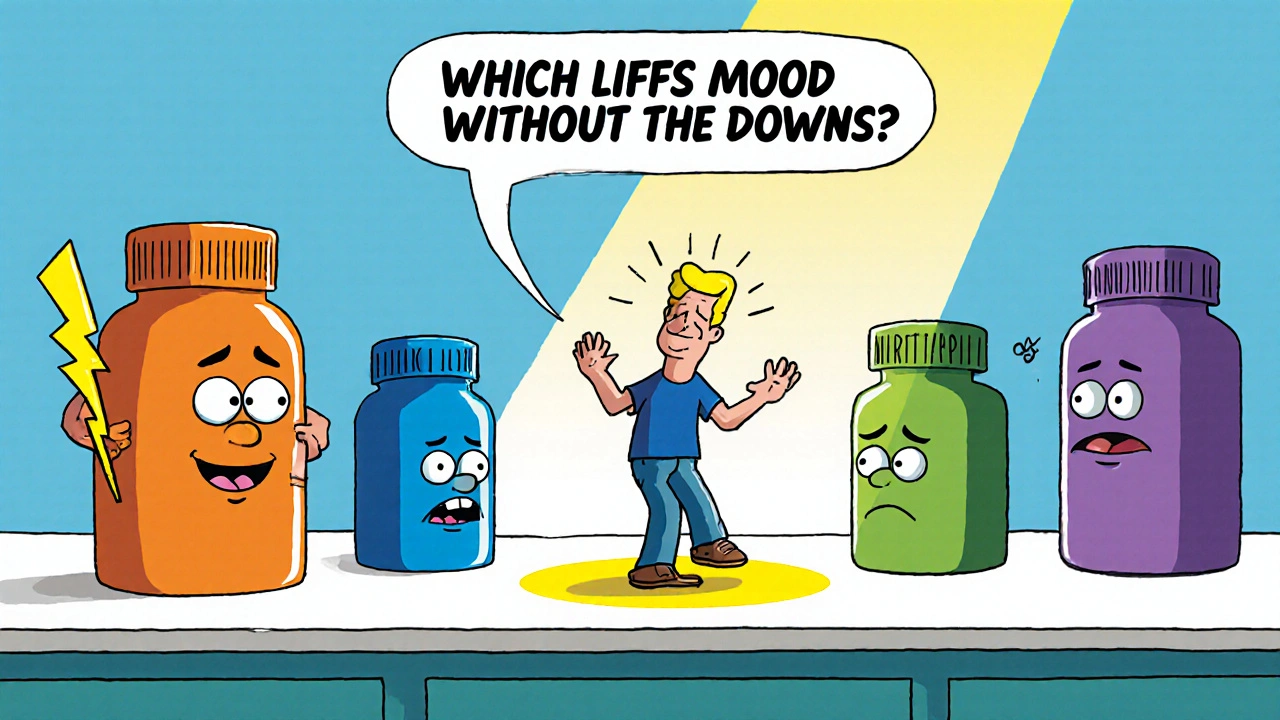Antidepressant Matchmaker
What matters most to you?
Select your top 2 priorities to see which antidepressants best match your needs
If you’re weighing Wellbutrin against other antidepressants, you’re not alone. People often ask which drug will lift mood without unwanted side‑effects like weight gain or sexual dysfunction. This guide breaks down Wellbutrin (Bupropion) and a handful of popular alternatives, letting you see the pros, cons, and where each one shines.
What is Wellbutrin (Bupropion)?
Wellbutrin (Bupropion) is a norepinephrine‑dopamine reuptake inhibitor (NDRI) approved for major depressive disorder and seasonal affective disorder. Unlike most antidepressants that target serotonin, Wellbutrin boosts dopamine and norepinephrine, which explains its energizing feel and lower risk of sexual side‑effects. Typical adult dosing starts at 150 mg once daily, often ramping to 300 mg per day split into two doses.
How We Compare Antidepressants
To keep the comparison fair, we focus on six practical criteria most patients care about:
- Mechanism of action - how the drug works in the brain.
- Efficacy - remission or response rates from clinical trials.
- Common side‑effects - especially weight change, sexual dysfunction, and insomnia.
- Withdrawal / discontinuation syndrome - how hard it is to stop.
- Cost - average U.S. retail price for a 30‑day supply (generic version).
- Drug interactions - major CYP450 pathways involved.
Below you’ll find a snapshot table, then deeper dives on each alternative.
Quick Reference Comparison Table
| Drug | Mechanism | Typical Dose | Response Rate* | Common Side‑effects | Weight Impact | Sexual Side‑effects | Avg. Monthly Cost (US$) |
|---|---|---|---|---|---|---|---|
| Wellbutrin | NDRI (dopamine & norepinephrine) | 150‑300 mg daily | ≈ 60 % | Insomnia, dry mouth, tremor | Neutral or slight loss | Low | 30‑45 |
| Sertraline | SSRI (serotonin reuptake) | 50‑200 mg daily | ≈ 55 % | GI upset, insomnia, headache | Neutral | Moderate | 15‑25 |
| Fluoxetine | SSRI | 20‑80 mg daily | ≈ 58 % | Insomnia, anxiety, GI nausea | Potential gain | Moderate | 20‑30 |
| Venlafaxine | SNRI (serotonin & norepinephrine) | 75‑225 mg daily | ≈ 65 % | Hypertension, nausea, sweating | Neutral | Low‑moderate | 25‑40 |
| Mirtazapine | NaSSA (noradrenergic & specific serotonergic) | 15‑45 mg at bedtime | ≈ 65 % | Heavy sedation, increased appetite | Weight gain | Low | 25‑35 |
| Escitalopram | SSRI | 10‑20 mg daily | ≈ 58 % | Nausea, fatigue, dry mouth | Neutral | Moderate | 20‑30 |
| Duloxetine | SNRI | 30‑60 mg daily | ≈ 63 % | Dry mouth, constipation, fatigue | Neutral | Low‑moderate | 30‑45 |
Deep Dive: Wellbutrin (Bupropion)
Because Wellbutrin is the anchor of this article, let’s explore its nuances. The NDRI profile means it rarely causes the classic SSRI‑related sexual dysfunction. It can also help with smoking cessation, a FDA‑approved use not shared by most other antidepressants. However, because it raises dopamine, there’s a small seizure risk at doses above 450 mg daily - a reason clinicians start low and titrate slowly.
In practice, patients report a boost in energy and concentration within 1‑2 weeks, often earlier than the mood lift seen with SSRIs. This makes Wellbutrin a good option for people whose depression is marked by fatigue or lack of motivation.
Alternative #1: Sertraline
Sertraline is one of the most prescribed SSRIs worldwide. By blocking serotonin reuptake, it raises mood but can also bring nausea, insomnia, and a moderate chance of sexual side‑effects. It’s considered safe in pregnancy and has a relatively low discontinuation syndrome, which is why many clinicians start here for first‑line therapy.
Sertraline’s dose flexibility (50‑200 mg) makes it adaptable, yet the onset of full effect can be 4‑6 weeks - longer than Wellbutrin’s early energizing feel.
Alternative #2: Fluoxetine
Fluoxetine (Prozac) is an SSRI with a very long half‑life, meaning it stays in the system for weeks after stopping. This smooths out withdrawal but also prolongs any side‑effects. It tends to be activating, which can help with a “flat” mood, yet many patients experience anxiety or insomnia early on.
Its long half‑life also makes it useful for patients who may miss doses, but the trade‑off is a delayed wash‑out period if you ever need to switch drugs.
Alternative #3: Venlafaxine
Venlafaxine belongs to the SNRI class, hitting both serotonin and norepinephrine. This dual action can produce a stronger antidepressant effect, reflected in slightly higher response rates in meta‑analyses. The downside? At higher doses (>150 mg), blood pressure can rise, so regular monitoring is advised.
Venlafaxine’s discontinuation syndrome is more noticeable than that of SSRIs - patients may feel electric‑shock sensations (“brain zaps”) if they stop abruptly.
Alternative #4: Mirtazapine
Mirtazapine works by enhancing norepinephrine and serotonin release while blocking certain serotonin receptors. Its hallmark is strong sedation, which many patients with insomnia appreciate. Unfortunately, it also stimulates appetite, leading to weight gain in a large portion of users.
Because of the sedative effect, clinicians often give it at night and pair it with a morning stimulant (or a less sedating antidepressant) to balance energy levels.
Alternative #5: Escitalopram
Escitalopram is the S‑enantiomer of citalopram, offering a slightly cleaner side‑effect profile. Studies show marginally higher remission rates than generic citalopram, but the difference is modest. It’s generally well‑tolerated, with fatigue and mild GI upset being the most common complaints.
Escitalopram’s dosing is simple (10‑20 mg) and it carries a low risk of QT prolongation at standard doses, making it a solid first‑line contender.

Alternative #6: Duloxetine
Duloxetine is an SNRI also approved for chronic pain conditions like diabetic neuropathy and fibromyalgia. Its dual action can help patients whose depression co‑exists with persistent pain. Typical side‑effects include dry mouth, constipation, and occasional dizziness.
Because it influences both serotonin and norepinephrine, duloxetine can raise blood pressure in susceptible individuals, so occasional monitoring is recommended.
When to Choose Wellbutrin Over the Rest
- Energizing effect: If fatigue and low motivation dominate your depression, Wellbutrin’s dopamine boost often feels faster than SSRIs.
- Weight concerns: Wellbutrin is neutral or may cause slight weight loss, unlike mirtazapine’s tendency to add pounds.
- Sexual side‑effects: The NDRI class has the lowest rates of libido loss.
- Smoking cessation: Wellbutrin is the only antidepressant with an FDA‑approved smoking‑quit indication.
Conversely, if you have a history of seizures, high blood pressure, or you’re pregnant, you might steer away from Wellbutrin and pick an SSRI or SNRI with a safer profile.
How to Talk to Your Doctor About Switching
Preparation is key. Bring a list that includes:
- Current dose and how long you’ve been on it.
- Specific side‑effects you’re experiencing.
- Any other health conditions (e.g., hypertension, pregnancy).
- Cost concerns - note that generic Wellbutrin is inexpensive, but some alternatives may be covered better by your insurance.
Ask about a taper schedule if you’re moving off Wellbutrin; a gradual reduction over 1‑2 weeks helps avoid discontinuation symptoms. Also request guidance on the “wash‑out” period if your new drug needs a clear gap (e.g., switching to fluoxetine).
Bottom Line: No One‑Size‑Fits‑All
Every antidepressant has a unique chemistry, side‑effect fingerprint, and cost curve. Wellbutrin shines for energy, weight stability, and low sexual dysfunction, but it isn’t perfect for everyone. By weighing the six criteria above, you can match your personal health profile to the drug that makes the most sense.
Frequently Asked Questions
Can I take Wellbutrin with an SSRI?
Yes, clinicians sometimes combine an NDRI like Wellbutrin with an SSRI to boost efficacy while balancing side‑effects. However, the combo can raise the seizure risk, so your doctor will monitor dosage carefully.
Why does Wellbutrin sometimes cause insomnia?
Because it increases dopamine and norepinephrine, Wellbutrin can be stimulating, especially if taken later in the day. Switching the dose to morning or using a lower dose often solves the problem.
Is Wellbutrin safe for people with a history of seizures?
The seizure risk rises when doses exceed 450 mg daily or when the drug is used with other seizure‑lowering medications. If you have a seizure disorder, your doctor may choose a different antidepressant.
How long does it take to feel the full effect of Wellbutrin?
Many patients notice an energy boost within 1‑2 weeks, but the full antidepressant impact usually appears after 4‑6 weeks of consistent use.
Which antidepressant is best for weight‑gain concerns?
Wellbutrin and most SSRIs are weight‑neutral. Mirtazapine is the clear outlier for weight gain, while bupropion‑based products are often chosen when patients fear gaining pounds.






Nhasala Joshi
October 18, 2025 AT 19:19Ever notice how the pharmaceutical giants hide the true neurochemical paradigms behind a veil of corporate secrecy? The Wellbutrin vs. SSRI debate is just the tip of the iceberg 🚨🧠. They manipulate data streams to keep us guessing about the real efficacy and side‑effect matrix. Wake up, the shadow pharma doesn’t want you to know the full story! 😈
Karla Johnson
October 19, 2025 AT 23:06When you dive into the pharmacologic landscape of depression, the first thing that becomes apparent is the sheer heterogeneity of both the disorder and the drugs designed to treat it.
Wellbutrin’s mechanism as a norepinephrine‑dopamine reuptake inhibitor sets it apart from the serotonin‑centric SSRIs that dominate most formularies.
This difference is not just academic; it translates into real‑world effects on energy, motivation, and sexual function that many patients cite as make‑or‑break factors.
The data in the comparison table suggest a response rate that is competitive with the best‑performing agents, hovering around sixty percent.
Moreover, the side‑effect profile shows a lower propensity for weight gain and sexual dysfunction, both of which are frequent reasons for discontinuation.
On the flip side, the seizure risk-though modest at therapeutic doses-remains a concrete contraindication for a subset of patients with pre‑existing seizure disorders.
Cost is another pragmatic consideration; while the generic version of bupropion is affordable, insurance formularies sometimes favor SSRIs, pulling the price differential into the realm of a few dollars per month.
Clinicians also have to weigh the withdrawal profile, which for Wellbutrin is relatively mild compared with agents like venlafaxine that are notorious for “brain zaps.”
The interaction landscape is fairly clean, with bupropion being a moderate CYP2B6 inhibitor, something prescribers should keep in mind when patients are on certain antiviral or antiretroviral regimens.
For patients who smoke, the dual indication for smoking cessation adds an extra layer of utility that many other antidepressants simply cannot claim.
If a patient presents with prominent insomnia, the stimulant‑like qualities of Wellbutrin may actually exacerbate the problem, prompting a dose‑timing adjustment to the morning.
Conversely, for someone battling the lethargy that typifies atypical depression, that very same energizing effect can be a therapeutic boon.
In practice, the decision often collapses to a shared decision‑making conversation where the clinician outlines the trade‑offs and the patient voices their preferences regarding weight, libido, and lifestyle.
The table also reminds us that no drug is a universal panacea; individual metabolism, comorbidities, and personal values shape the final choice.
Ultimately, whether Wellbutrin or an SSRI shines for a given individual hinges on a nuanced balance of efficacy, side‑effects, cost, and the patient’s own narrative about what they need from their medication.
Linda A
October 21, 2025 AT 02:53In the grand tapestry of mental health, each medication is a thread that must be woven with intentionality. Wellbutrin's dopaminergic boost offers a distinct hue, yet the same thread may fray for those with seizure histories. The philosopher in me muses on the paradox of seeking equilibrium through chemical means.
Joe Moore
October 22, 2025 AT 06:40Yo, the whole pharma game is a massive cover‑up, they don’t want us to see the real side‑effects, especially the hidden neuro‑mods. Wellbutrin might seem cool but it can mess with your brainwaves if you’re not careful, definatly not for everybody. Cuz they hide the truth in all those tiny print notes!
Janet Morales
October 23, 2025 AT 10:26Let’s be blunt: the hype around Wellbutrin’s “energy boost” is just a marketing ploy to sell more pills. If you crave real change, look beyond the glossy brochures and demand transparent data.
Tracy O'Keeffe
October 24, 2025 AT 14:13Ah, the nuanced symphony of neuropharmacology! While Wellbutrin pirouettes on the dopaminergic stage, the SSRIs waltz in the serotonergic ballroom. One must, however, critically assess the ontological implications of prescribing based solely on cost vectors.
Drew Waggoner
October 25, 2025 AT 18:00Wellbutrin can feel like a double‑edged sword, lifting the veil of gloom but also sharpening the edge of anxiety for some.
The trade‑off is worth pondering before committing to a daily regimen.
Mike Hamilton
October 26, 2025 AT 20:46Wellbutrin is good for some, but prtty sure it isn’t a cure all.
If you have any other med, check with your doc so they can see if there’s any interactons.
Theres no one size fits all in mental health.
Matthew Miller
October 28, 2025 AT 00:33Reading the deep dive, it’s clear that Wellbutrin can be a game‑changer for those stuck in a fog of fatigue.
Imagine waking up feeling like you have a spark again, ready to tackle the day.
That’s the promise many patients describe when the drug clicks.
But remember, the journey is personal; not every spark lights the same way.
Liberty Moneybomb
October 29, 2025 AT 04:20The powers that be don’t want you to feel that spark – they’d rather keep you in the shadows of chronic lethargy.
When you push back and claim that energy, you’re essentially rebelling against the hidden agenda.
Stay vigilant, stay energized.
Grace Hada
October 30, 2025 AT 08:06Wellbutrin’s hype is overstated; stick to proven SSRIs.
alex montana
October 31, 2025 AT 11:53Wellbutrin...?? It’s... okay? maybe? but not... sure!;…
Wyatt Schwindt
November 1, 2025 AT 15:40It’s understandable why people are drawn to Wellbutrin’s profile, especially when weight and libido are concerns.
Choosing a medication is a personal decision that should involve open dialogue with a clinician.